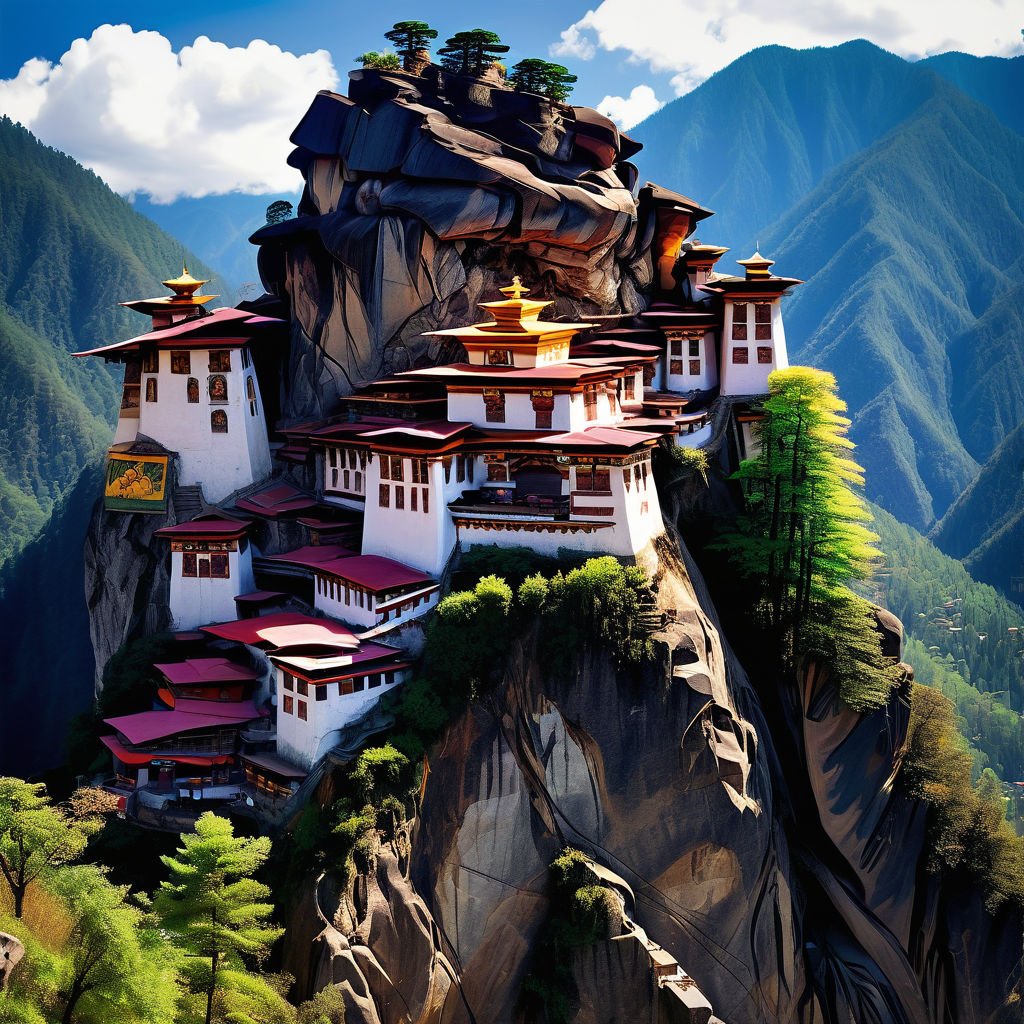Introduction to Bhutan: The Land of the Thunder Dragon
Discover Bhutan: A Harmonious Blend of Tradition and Modernity

Introduction to Bhutan
Bhutan, officially known as the Kingdom of Bhutan, is a small, landlocked country in South Asia located in the Eastern Himalayas. It is bordered by China to the north and India to the south, east, and west. Thimphu is the capital and largest city, serving as the political and economic heart of the country. Bhutan is renowned for its stunning landscapes, which range from subtropical plains in the south to the subalpine Himalayan mountains in the north, and its rich cultural heritage deeply rooted in Buddhism. Bhutan's cultural heritage is a unique blend of traditional and spiritual elements. The country is famous for its dzongs (fortresses), monasteries, and vibrant festivals like Tshechu, where locals don traditional attire and participate in masked dances and rituals. Bhutanese cuisine, which features dishes like Ema Datshi (chili and cheese stew) and Momos (dumplings), reflects the country's agricultural practices and climatic conditions. The concept of Gross National Happiness (GNH), which prioritizes well-being over economic growth, further underscores Bhutan's distinctive cultural identity.
Cross-national and Cross-cultural Understanding
Bhutanese people generally exhibit a welcoming and open attitude towards other cultures, though they maintain a strong sense of national identity and cultural preservation. This openness is fostered by the country's policies of controlled tourism and its efforts to promote cultural exchange while safeguarding its traditions. Cultural exchanges play a significant role in fostering cross-cultural understanding in Bhutan. The country hosts various festivals and events that celebrate both local and international traditions. The Royal Highland Festival, for example, brings together communities from different parts of the country and international participants to celebrate the highland culture and promote cultural exchange through music, dance, and traditional sports. Additionally, the Mountain Echoes Literary Festival, held annually in Thimphu, attracts writers, artists, and thinkers from around the world, promoting dialogue and mutual appreciation. Educational programs in Bhutan emphasize global awareness and cross-cultural understanding. Schools and universities incorporate multicultural perspectives into their curricula, encouraging students to appreciate and respect diversity. The Royal University of Bhutan collaborates with international institutions to facilitate student and faculty exchanges, enriching the educational experience and fostering global connections.
Interactions and Social Dynamics
Typical interactions between Bhutanese people and foreigners are characterized by warmth, respect, and a strong sense of community. Social behaviors in Bhutan reflect a blend of traditional customs and contemporary influences, emphasizing respect for others, hospitality, and communal living. Communication styles in Bhutan are generally informal and polite. Dzongkha is the official language, but English is widely spoken, especially in educational and official contexts. This bilingualism facilitates interactions with tourists and expatriates, making it easier for them to integrate into the local community. Cultural norms in Bhutan place a strong emphasis on respect for elders, community involvement, and a relaxed approach to time. These norms create a welcoming and inclusive atmosphere for foreigners, who often find it easy to adapt to the local way of life. Public displays of affection are generally limited, in line with traditional and religious customs, but social gatherings and communal activities are vibrant and inclusive.
Views on Dating and Relationships
Attitudes towards dating and relationships with foreigners in Bhutan are generally open and accepting, though they are influenced by cultural and religious values. Bhutanese people recognize the opportunities for cultural exchange and personal growth that such relationships can bring. However, cultural expectations and traditions play a significant role in shaping these views. Family involvement is significant in relationships in Bhutan, with elders often playing a crucial role in the approval process. Traditional customs emphasize respect, patience, and the gradual building of trust in relationships. While modern dating practices influenced by global trends are becoming more common among younger generations, traditional values still hold sway in many communities.
Marriage and Family
Marrying a foreigner in Bhutan involves navigating both legal and social considerations. Legally, the country has clear regulations governing marriage, including residency requirements and the need for proper documentation. Socially, cross-cultural marriages are generally accepted, though couples may face challenges related to cultural differences and integration. Familial acceptance is a key factor in cross-cultural marriages. Bhutanese families can be protective, and gaining their approval is often essential for the relationship's success. However, the diverse cultural landscape of Bhutan means that many families are already familiar with and accepting of different cultural backgrounds, which can facilitate smoother integration for foreign spouses. Trends in cross-cultural marriages reflect Bhutan's open and inclusive society. Many Bhutanese who travel abroad for education or work form relationships with individuals from various cultures, bringing back diverse customs and traditions that enrich the local community.